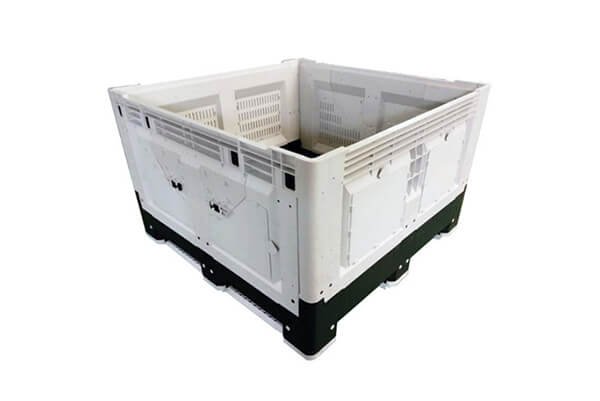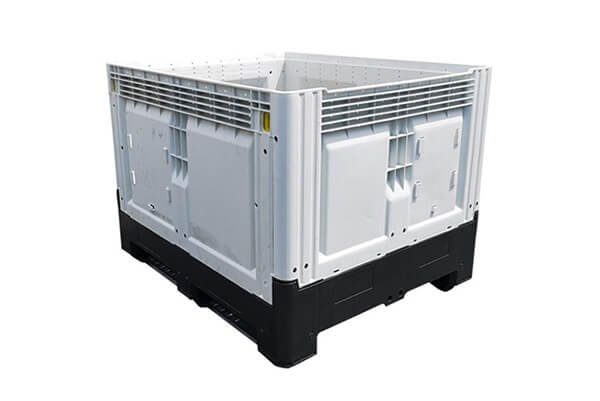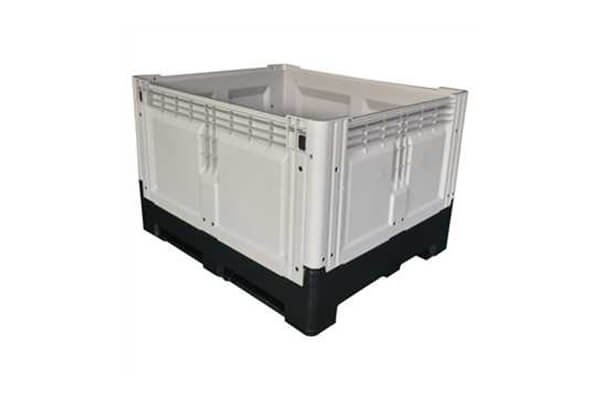Introduction
In today’s fast-paced supply chain and logistics industry, efficiency is key to maintaining profitability and customer satisfaction. Warehouses and distribution centers always look for ways to streamline operations, reduce costs, and improve storage solutions. One essential component in achieving these goals is the use of a solid plastic pallet box. These durable, high-capacity containers offer a range of advantages that help businesses optimize warehouse storage, enhance logistics efficiency, and protect goods during transport.
This article explores how solid pallet boxes contribute to better warehouse management and logistics operations, offering insights into their benefits, applications, and best practices for maximizing their potential.
What Is a Solid Plastic Pallet Box?
Solid pallet boxes are robust, enclosed storage containers designed for handling, transporting, and storing various goods efficiently. They are typically made from materials like high-density polyethylene (HDPE), polypropylene (PP), or durable wooden and metal constructions. Unlike standard pallets that require external wrapping or containers, solid pallet boxes provide complete protection for goods while allowing easy stacking and mobility.
These boxes come in various sizes and capacities, and they can be used in multiple industries, from manufacturing and agriculture to retail and pharmaceuticals. Their stackability, durability, and reusability make them an excellent choice for businesses aiming to improve warehouse organization and logistics efficiency.

Benefits of Using the Solid Plastic Pallet Box in Warehouse Storage
1. Maximizing Space Utilization
One of the primary challenges in warehouse management is optimizing storage space. Solid pallet boxes help in maximizing space through efficient stacking and uniform dimensions. Since these boxes are designed to fit seamlessly within racking systems and on forklifts, they allow businesses to utilize both floor and vertical space efficiently.
Additionally, collapsible solid pallet boxes provide a space-saving solution when not in use. These foldable versions help reduce storage volume when empty, further enhancing warehouse organization.
2. Enhanced Protection for Goods
Unlike traditional open pallets or flimsy storage solutions, solid pallet boxes offer enclosed protection against external elements like dust, moisture, and physical damage. This is particularly beneficial for industries dealing with fragile, perishable, or sensitive materials, such as food, pharmaceuticals, and electronics.
The sturdy construction of these boxes ensures that goods remain intact and undamaged, reducing the risk of product loss and returns, and ultimately saving businesses time and money.
3. Improved Inventory Management and Organization
Solid pallet boxes contribute to better inventory control by allowing easy categorization and labeling. Since they can be used for both bulk storage and individual product containment, businesses can implement an efficient warehouse management system (WMS) that ensures quick retrieval and tracking of goods.
For example, companies can use barcodes or RFID tracking on pallet boxes to monitor stock levels, expiration dates, and product locations, thereby streamlining logistics operations and reducing manual handling errors.
4. Durability and Cost Savings
Investing in high-quality solid pallet boxes results in long-term cost savings. Unlike disposable cardboard or wooden crates that degrade over time, solid pallet boxes are designed for multiple reuse cycles, reducing the need for frequent replacements.
Moreover, their robust construction minimizes breakage and damage, translating to lower operational costs and a more sustainable approach to warehouse storage.

How the Solid Pallet Plastic Box Enhances Logistics Efficiency
1. Facilitating Faster and Safer Handling
Logistics operations rely heavily on efficient material handling. Solid pallet boxes are designed for seamless transportation using forklifts, pallet jacks, and conveyor systems. Their standardized design ensures easy lifting, moving, and loading, thus improving workflow efficiency.
Additionally, these boxes reduce manual handling, minimizing the risk of workplace injuries and improving overall safety within the warehouse and logistics network.
2. Optimizing Supply Chain Operations
A smooth-running supply chain depends on efficient storage and transportation solutions. Solid pallet boxes help optimize supply chain processes by offering:
- Faster loading and unloading of trucks and containers
- Standardized packaging that facilitates cross-docking and seamless transfers
- Reduced need for repackaging, saving time and labor costs
By streamlining these logistics aspects, businesses can enhance delivery timelines and meet customer demands more effectively.
3. Supporting Sustainable and Eco-Friendly Logistics
Sustainability is becoming a top priority for businesses worldwide. Solid pallet boxes contribute to eco-friendly logistics practices in several ways:
- Reusability: Unlike single-use packaging, solid pallet boxes are reusable, reducing waste.
- Recyclability: Many pallet boxes are made from recyclable plastic or materials that can be repurposed, lowering environmental impact.
- Reduced reliance on secondary packaging: Their protective design eliminates the need for excessive wrapping materials, such as shrink wrap or disposable cartons.
By adopting sustainable storage solutions like solid pallet boxes, companies can align with green logistics initiatives and reduce their carbon footprint.

Industries That Benefit from the Solid Plastic Pallet Box
Several industries rely on solid pallet boxes to improve their warehouse and logistics operations. Some key sectors include:
- Retail and E-commerce: Ensures secure transportation and efficient warehouse storage of bulk goods.
- Automotive: Stores and transports heavy car parts safely.
- Agriculture and Food Processing: Protects perishable items from contamination and damage.
- Pharmaceuticals and Healthcare: Maintains the integrity of sensitive medical supplies.
- Manufacturing and Industrial: Provides a durable storage solution for raw materials and finished goods.
Best Practices for Using the Solid Plastic Pallet Box in Warehousing and Logistics
To maximize the benefits of solid pallet boxes, businesses should follow these best practices:
- Choose the Right Material and Size. Select pallet boxes based on weight capacity, material type, and stacking capabilities to suit your warehouse needs.
- Implement an Effective Labeling System. Use barcodes or RFID tracking to enhance inventory management and reduce errors.
- Train Staff on Proper Handling and Storage. Educate warehouse workers on the correct ways to lift, stack, and transport solid pallet boxes safely.
- Regular Maintenance and Cleaning: Periodically inspect and clean pallet boxes to extend their lifespan and maintain hygiene standards.
- Adopt a Recycling and Reuse Strategy. Ensure proper recycling of worn-out pallet boxes and integrate reusable options to support sustainability efforts.
Conclusion
The Solid plastic pallet box plays a crucial role in enhancing warehouse storage and logistics efficiency. Their space-saving design, durability, protective features, and ease of handling make them an invaluable asset for businesses looking to optimize operations. From reducing product damage and improving supply chain efficiency to supporting sustainability initiatives, these storage solutions offer significant advantages across various industries.
By integrating solid pallet boxes into their logistics and warehousing strategies, companies can achieve better cost savings, operational efficiency, and environmental responsibility. Investing in these high-quality storage containers is a smart move for businesses aiming to stay competitive in the modern supply chain landscape.

